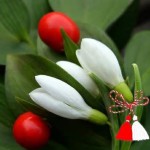Throughout history, many cultures have held festivals and observances to mark the changing of the seasons. Such was the norm millennia ago in pre-Christian Europe as can be seen in the beliefs and practices of Wicca which is a modern manifestation of ancient nature based religions. Other festivals were adopted by the Christian church and incorporated into such major holidays and Christmas, Easter and All Saints’ Day while other observances remained very much a local matter and exist today in a modified form as local folk festivals. One such holiday is Martisor or Martenitsa and is celebrated on March 1st in Romania and Bulgaria as a day of love, friendship and anticipation for the coming spring.
Martisor or Martenitsa as the 1st of March is known in Romania and Bulgaria respectively is an ancient holiday that heralds the coming of spring. The origins of Martisor are obscure and anthropologists speculate that it could have its roots in both Roman and Dacian practices. The Dacian people were the original inhabitants of what is today Romania until they were conquered and integrated into the Roman Empire in the 1st Century AD. Very little remains of their culture and language, except a few words that have found their way into modern Romanian which is Romance language descending from Latin. It is possible that Martisor and its Bulgarian counterpart Martenitsa have their origins in an ancient Dacian celebration welcoming the early spring. It is also worth mentioning that the 1st of March was the Roman New Year and a time to honor Mars, the god of war, so one could draw the conclusion that Martisor is a fusion of ancient Roman and Dacian practices.
Curiously, unlike many ancient Pagan celebrations, Martisor was never fully Christianized but survived into modern times as a lighthearted celebration of spring, love and friendship. In Romanian and Bulgarian folklore there are legends that speak of a Mother Earth spirit named Baba Dochia (Romanian) and Baba Marta (Bulgarian) that is particularly active during this time, which could indicated that Martisor originated as an ancient festival honoring the local manifestation of the Mother Earth Goddess. Today in Romania it is traditional to give little metallic charms, often in the shape of birds or other animals, tied with a braided red and white string. It is also customary to give red and white flowers to loved ones. In Bulgaria, there exists a tradition of tying a red and white bracelet made of braided string around one’s wrist on the 1st of March and making a wish. The bracelet is word until one sees a budding tree at some point in March and the bracelet is left on the tree. I lived for years in a college town in Massachusetts where there are several Bulgarian students and I remember one spring seeing many red and white ribbons hanging from trees on campus.
If you would like to access the happy, positive energy associated with Martisor, wearing a red and white string bracelet on the 1st of March would be a good way to do so. You could also light a white and red candle and meditate on what positive changes you’d like to create in the upcoming spring and summer months and as Martisor is an Earth festival, remember to thank the Earth for all the blessings and sustenance she has provided for you and give thanks to God, the Ancestors and Saints always!
I hope you have enjoyed learning about Martisor and I hope the upcoming spring brings you abundant blessings and much happiness!

